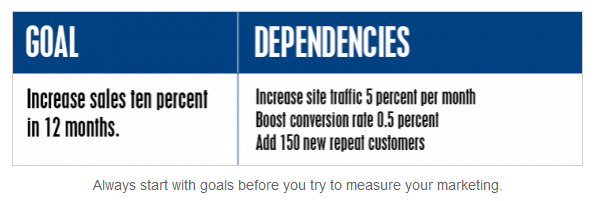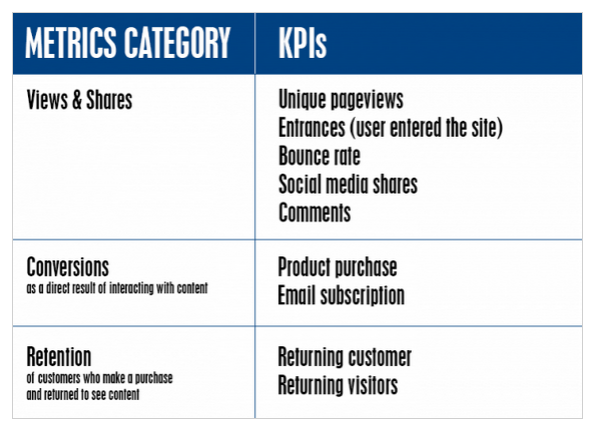Important Metrics to Help You Measure Your Content Marketing
Top marketers agree that executing the right content marketing strategies can help companies gain new customers, increase conversions, and grow their businesses. But unless marketers establish clear-cut and measurable goals, they cannot clearly demonstrate how successful their strategies have been for the business.
This is where content marketing metrics come in. Sustainable success doesn’t usually happen overnight, regardless of the tactics marketers have implemented in their marketing campaigns. Knowing when a strategy is working is undoubtedly essential, especially for marketers who have established goals for a specific time frame. When executed and monitored correctly, content marketing initiatives can yield more successful results.
The Importance of Goal-Setting
“Before you can decide whether a marketing strategy or tactic is working well or not, you need to know what you are trying to accomplish,” Armando Roggio (@armandoroggio) wrote in an article that appeared on Practical Ecommerce (@PracticalEcomm).
Roggio encouraged marketers to identify their goals before they try to measure their content marketing initiatives. He emphasized, “In fact, you need to know what your business goals are before you start to create content so that your content can be tailored, if you will, toward success.”
What do you want to accomplish in a period of four months? In a period of one year? The first step to know whether you’re actually hitting the bull’s-eye is to understand your objectives. In his article, Roggio mentioned the importance of establishing SMART (specific, measurable, attainable, relevant, and time-bound) goals, and how breaking these objectives into dependencies could help marketers effectively measure their content performance. [See Figure 1]
If your content aligns with these goals, you’ll be able to measure the impact where you need to see impact, with the help of some important metrics.
Measuring the Success of Your Content Marketing
Once you’ve established the objectives and components of your content marketing plan, the next step is to determine which metrics you will use in order to accurately define the success of your content marketing.
Listed below are some of the metrics recommended by Jay Bear of Convince & Convert (@convince):
- Consumption metrics. These metrics should provide you with the actual or estimated number of people who consume your online content, measured as page views, downloads, or views. You can easily derive these kinds of data through platforms such as Google Analytics or Facebook Page Insights.
- Sharing metrics. These metrics should let you know the number of shares your online content receives. Knowing this can help you better understand if your content is in fact resonating with your target audience or if you need to adjust your tactics to more effectively engage your prospects.
- Lead generation metrics. Monitoring whether your lead generation efforts are successful is one of the most valuable metrics you need to take note of when it comes to content marketing. Lead generation metrics can be measured through factors like number of whitepaper downloads or email subscriptions.
- Sales metrics. Do your online visitors often convert into paying customers? Sales metrics will help you track whether you’re getting ROI or simply wasting money on your content marketing. In the end, the revenue you get from you marketing efforts is what determines the success of your campaigns.
Apart from these four, several other metric categories with their associated KPIs were mentioned to further help marketers monitor their content marketing. These include their total reach, engagement, and conversions. Figure 2 show more metric categories with their corresponding KPIs.
What metrics do you use to measure your content marketing? How often do you analyze the impact of your strategy?
Paul Stinemetz
Paul is also the founder of Endlessrise and the Advanced Marketers Institute.
Paul Stinemetz was the first person to found a digital marketing agency that was 100% exclusively dedicated to only servicing marketing agencies on a white label basis. This company was called Endlessrise and was founded in 2008. Over the next 8 years Paul held true to his word and never accepted a retail client and made it possible for thousands of marketing companies to efficiently grow their retail digital marketing firms with low overhead, affordable service costs and elite leadership and coaching.
Paul not only led this industry but became known as one of the top marketing agency coaches. He went on to build one of the largest marketing platforms in the world and build an elite overseas operational marketing team.
Through his years of experience working hand in hand with small to large marketing agencies, Paul has spent the majority of his professional career building services, specialized operations, software, marketing material and coaching programs to help digital marketing agencies succeed.
Paul stands out as a unique consultant of his caliber and is unparalleled as a marketing agency consultant.
Paul is also the founder and current president of Advanced Marketers Institute, an educational platform that trains marketers on how to establish a consultancy based marketing company and intricate instruction on best consulting practices.
Latest posts by Paul Stinemetz (see all)
- Local Marketing News: Grow Your Local Business with Local Marketing - October 22, 2015
- Online Marketing News: Techniques for Savvy Marketers on a Budget - October 13, 2015
- SEO Tips: Using High-Quality Content for a Minimalist SEO Approach - October 12, 2015



